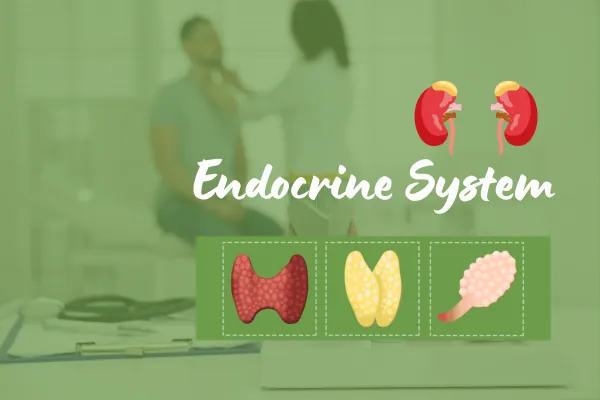
The endocrine system is a complex network of glands and organs that regulate and control various processes in the body. It plays a crucial role in maintaining homeostasis and overall well-being. In this article, we will explore the anatomy, function, and importance of the endocrine system in detail.
Table of Contents
1. Introduction to the Endocrine System
The endocrine system consists of a collection of glands that produce and release hormones into the bloodstream. These hormones act as chemical messengers, traveling throughout the body to regulate numerous physiological processes.
2. Anatomy and Function of the Endocrine System
Endocrine Glands and Hormones
The endocrine system includes several major glands, such as the pituitary gland, thyroid gland, adrenal glands, pancreas, and reproductive organs. Each gland secretes specific hormones that target specific cells or organs to regulate their function.
Communication and Regulation
Hormones produced by the endocrine glands help coordinate and integrate various bodily functions, including growth and development, metabolism, reproduction, and stress responses. They work together to maintain a delicate balance within the body.
3. Key Hormones of the Endocrine System
Thyroid Hormones
The thyroid gland produces hormones, primarily thyroxine (T4) and triiodothyronine (T3), which regulate metabolism, growth, and development. They play a crucial role in maintaining body temperature, energy levels, and the function of other organs.
Insulin and Glucagon
Produced by the pancreas, insulin and glucagon regulate blood sugar levels. Insulin helps cells absorb glucose from the bloodstream, while glucagon signals the liver to release stored glucose when blood sugar levels are low.
Adrenal Hormones
The adrenal glands produce hormones such as cortisol, which helps regulate the body’s response to stress, and aldosterone, which controls water and electrolyte balance. Adrenaline and noradrenaline are also produced, playing a role in the fight-or-flight response.
Reproductive Hormones
Reproductive hormones, such as estrogen, progesterone, and testosterone, are produced by the ovaries and testes. They are responsible for sexual development, fertility, and the maintenance of reproductive functions.
4. Importance of Hormonal Balance
Homeostasis and Health
Hormonal balance is crucial for maintaining homeostasis, a state of equilibrium within the body. When hormones are in balance, various bodily systems function optimally, promoting overall health and well-being.
Effects of Hormonal Imbalances
Hormonal imbalances can have significant effects on the body. For example, an underactive or overactive thyroid can lead to weight changes, fatigue, and mood disturbances. Imbalances in insulin can result in diabetes, and disruptions in reproductive hormones can cause fertility issues or menstrual irregularities.
5. Common Endocrine Disorders
Hypothyroidism and Hyperthyroidism
Hypothyroidism occurs when the thyroid gland does not produce enough thyroid hormones, leading to symptoms such as fatigue, weight gain, and depression. Hyperthyroidism, on the other hand, involves an overactive thyroid gland, causing symptoms such as weight loss, anxiety, and rapid heartbeat.
Diabetes
Diabetes is a metabolic disorder characterized by high blood sugar levels. It can occur when the pancreas does not produce enough insulin (Type 1 diabetes) or when the body becomes resistant to insulin (Type 2 diabetes).
Adrenal Insufficiency
Adrenal insufficiency occurs when the adrenal glands do not produce enough hormones, leading to fatigue, muscle weakness, and low blood pressure. This condition requires hormone replacement therapy.
Polycystic Ovary Syndrome (PCOS)
PCOS is a hormonal disorder affecting women and can cause hormonal imbalances, ovarian cysts, and difficulties with fertility. Symptoms may include irregular periods, weight gain, and excessive hair growth.
6. Lifestyle Factors Influencing the Endocrine System
Diet and Nutrition
A healthy diet rich in nutrients is essential for supporting the endocrine system. Nutrient deficiencies or excessive consumption of certain foods can disrupt hormonal balance. It is important to consume a balanced diet with an emphasis on whole foods, fruits, vegetables, lean proteins, and healthy fats.
Physical Activity and Exercise
Regular physical activity and exercise help regulate hormones, improve insulin sensitivity, and support overall hormonal balance. Engaging in activities such as cardiovascular exercise, strength training, and flexibility exercises can contribute to a healthy endocrine system.
Stress Management
Chronic stress can disrupt the endocrine system, leading to hormonal imbalances. Implementing stress management techniques such as meditation, deep breathing exercises, and engaging in activities that promote relaxation can help maintain hormonal balance.
7. Conclusion
The endocrine system is a complex network of glands and hormones that play a crucial role in maintaining overall health and well-being. Understanding its anatomy, function, and the importance of hormonal balance can empower individuals to make lifestyle choices that support a healthy endocrine system and optimize their overall health.
8. FAQs
1. How can I support the health of my endocrine system? Supporting the health of your endocrine system involves adopting a balanced diet, engaging in regular physical activity, managing stress levels, and getting regular check-ups with a healthcare professional.
2. Can hormonal imbalances be treated? Yes, hormonal imbalances can often be treated through hormone replacement therapies, medications, or lifestyle modifications. Consultation with a healthcare professional is crucial for an accurate diagnosis and appropriate treatment plan.
3. Are hormonal imbalances common? Hormonal imbalances can affect individuals of all ages and genders. They are relatively common and can be caused by various factors, including genetics, medical conditions, and lifestyle choices.
4. What are the signs of a hormonal imbalance? Signs of a hormonal imbalance may include weight changes, mood swings, fatigue, irregular menstrual cycles, hair loss, and changes in libido. However, these symptoms can vary depending on the specific hormonal imbalance.
5. How long does it take to restore hormonal balance? The time required to restore hormonal balance varies depending on the underlying cause, individual factors, and the chosen treatment approach. It may take weeks to months to achieve optimal balance, and regular monitoring is often necessary.




